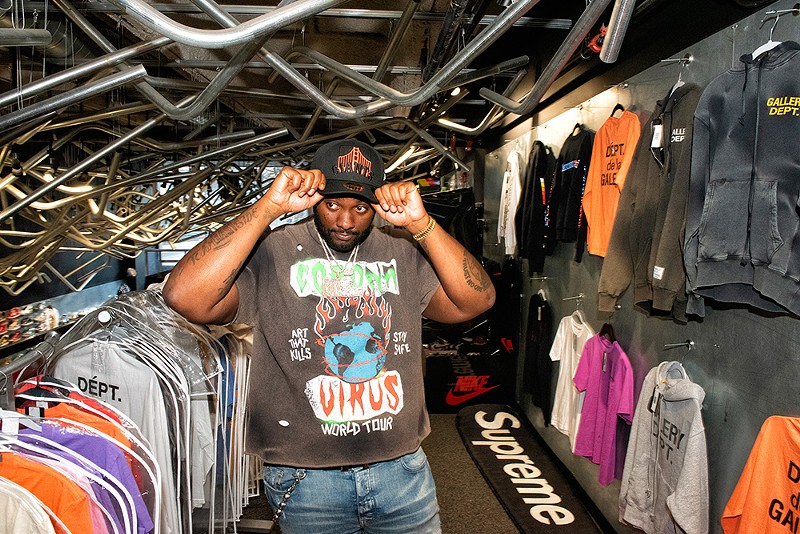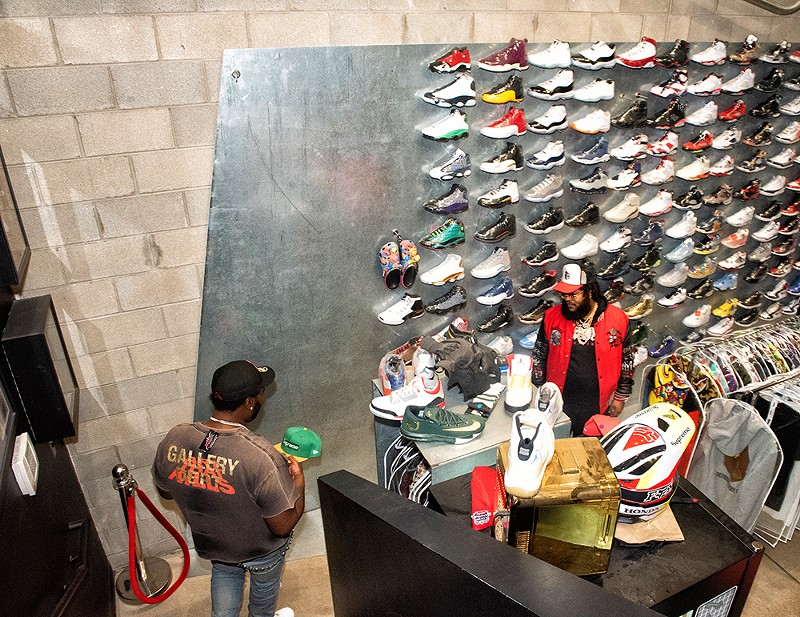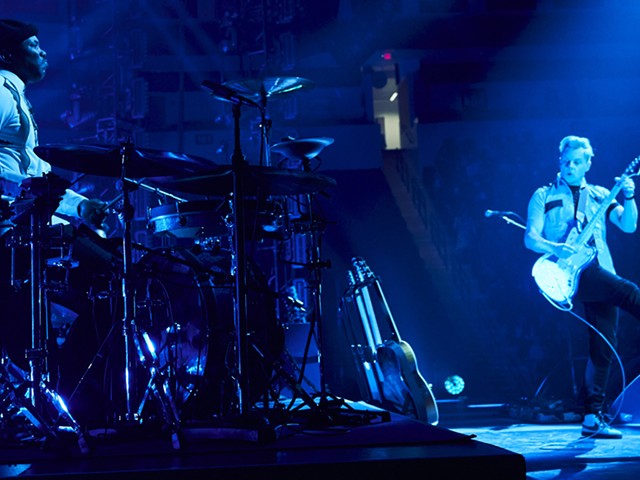Mother Nature is up to her usual Michigan antics on an afternoon earlier this spring. Just when you think it's warm enough to peel off your hoodie, a frigid gust of wind comes slapping around the corner, leaving angst and four-letter words in its wake.
Peezy, who has emerged as one of the most beloved of Detroit's current crop of hip-hop artists, is sitting behind the steering wheel of a white BMW in front of Nojo Kicks with girlfriend Koko. The sneaker store closed at 5:30 p.m., but is reopening for this interview. (Plus, Peezy needs a fresh fit for his show at the Garden Theater later this evening.) Owner Noah Beletskiy and another employee unlock the doors as Peezy and Koko step out of the BMW. He's dressed only in a long sleeve T-shirt and jeans — it seems he fell for Mother Nature's prank, too.
Once inside, the couple is joined by his manager Chelsea Donini, fellow emcee RMC Mike, Mike's friend Freeze, Empire Records CEO Ghazi Shanmi, and a security detail.
Peezy talks to everyone for a few minutes, walks upstairs, and immediately begins combing through the racks of clothes. He picks up a white T-shirt, tries it on, and yells downstairs to Noah, "You got this in a bigger size?"
He rumbles through a few more shirts. "Where da real heat at? Bring the good shit out!"
Peezy has an "easy like Sunday morning" vibe to himself today. He's carefree and kind of nonchalant. He looks slimmer and happier. He eyeballs a distressed brownish Gallery Dept. T-shirt, tries it on, and leaves it. "This the one right here," he says to himself.
Born Phillip Glen-Earl Peaks, "Peezy" is the only nickname or moniker the 33-year-old rapper has ever gone by. "My homeboy gave me that name," he says. "My first name starts with a P, so he just called me Peezy. I don't know why, but I liked it. It had a ring to it."
He grew up on Cedargrove Street on Detroit's east side, and says he's been a fan of hip-hop for as long as he can remember, citing Jay-Z, Dipset, DMX, Jadakiss, and Fabolous as early influences, and started rapping in 2004 as a freshman at Cooley High School. "I had got suspended from school and I wrote a song about it," he says casually. "That's when I discovered I knew how to write."
Peezy's relationship with high school dissipated quickly as he decided to drop out after eleventh grade. "School was just whack to me so I just stopped going," he admits. "I didn't have no shoes or clothes so I just couldn't click with it."
Cedargrove Street was like many other Detroit neighborhoods in the early 2000s. There were trap houses, vacant houses, well-kept houses owned by senior citizens, and a large working class of folks who were just trying to get by. Without the daily structure of school, Peezy spent more time "doing street shit" and "just trying to survive" than he did perfecting bars and punchlines. But even though he was engulfed in the lure of getting money, music eventually found its way to the top of his priority list. By 2010, Peezy and several other emcees were mainstays at Cloud 9 studio.
"Me and Perry (Lil P), that's my best friend," Peezy says. "Me and him connected because my cousin Angelo and him was best friends. Him and Dame went to Finney High School. Snoop came with him because he was my best friend from the neighborhood."
Along with emcees Babyface Ray, D-Nice, and Lou, the group released a track titled "Eastside Where the Real Money At" — and took Detroit by storm.
"Twitter was real big when the music came out," Peezy says. "People commenting and hitting '#TeamEastside,' and we was like, 'Fuck it, we Team Eastside then.'"
The name became official and in 2011 the group released its first project, We In Here.
"I burned our first CD and took it up to this shit called Press Play at the mall and gave him that bitch for free and told him, 'I don't want no money, just put it out, sell it, or do whatever the fuck you want to do with it," he says.
Before Peezy got back home, he says the guy at Press Play was calling him to bring more copies. Team Eastside also pursued other creative marketing tactics.
"DJ ILL WILL was at 007. That was the biggest strip club at the time, so we would take all our music to him and he would play it up there," Peezy says. "A lot of east side niggas would be getting money and making it rain to our music, even the dancers started requesting it."
We in Here was full of raw aggressive gangsta narratives about stacking dollars and surviving street life. Songs like "Ball or Get Balled On," "Count It," and "Shut It Down" were punctuated with contagious hooks as the group constantly reminded listeners they were from the east side of Detroit.
"I rap about what I've seen, what I've been through. My upbringing, the shit that I've seen gives me content," he says, adding, "It was just a lot going on. I saw a lot at a young age and I got a lot of content."
The year 2011 was a banner year for Detroit hip-hop. Royce da 5'9" united with Eminem to create the duo Bad Meets Evil, Danny Brown came into his own with XXX, Big Sean dropped his debut Finally Famous, Slum Village alum Elzhi released the critically acclaimed Elmatic, and Doughboyz Cashout's No Deal On Chill continued the group's status as the most popular street rap group in the city.
"When we came out, wasn't nobody rapping from the east side," Peezy says. "So when we came out they was like, 'Bout time somebody putting on for us out here.'"
Peezy's statement is mostly true. The Eastside Chedda Boyz had been the last hip-hop group from the east side of Detroit to make a viral impact. Team Eastside's emergence was met with a lot of fist bumps, retweets, and ovations.
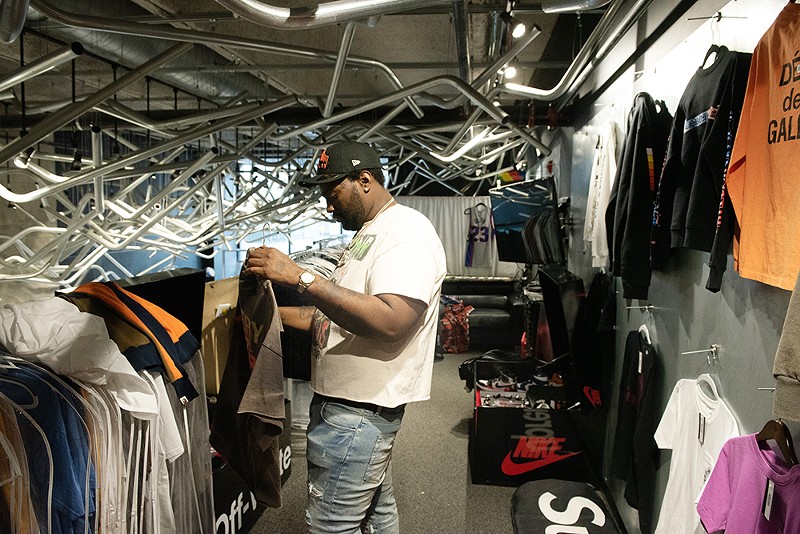
"It's not uncommon for people to want to hear music or voices from their neighborhoods," says Dr. Khalid el-Hakim, a historian who previously managed Proof's Iron Fist Records. "On the outside looking in, a school like Osborne doesn't seem much different from Mumford. But if you went to those schools and lived in those neighborhoods, I'm sure you feel like they're a lot different and the stories that come from there resonate in different ways."
The pride both west side and east side residents have in their neighborhoods has created an oscillating tension that goes back to the early 1930s during the Great Migration.
"Because of racial redlining, many Blacks were only able to find places to live on the east side or Black Bottom," says el-Hakim.
During that time the west side of Detroit had a suburb-type appeal. As time went by Black residents were able to move there due to more economic opportunities and white flight. With the shift, some perspectives started to change.
"Geographical movement and having new access changes people's attitudes toward each other," says el-Hakim.
"When people got money they moved to the west side, so the east side was viewed as below the west side, even though there is more money on the east side," says veteran emcee Street Lord Juan.
The unnecessary judgements had mostly stayed non-existent within Detroit's hip-hop community. The Hip-Hop Shop, for example, was a west-side melting pot.
"You had Maurice Malone, you had Proof, Elzhi, you had 5Ela, you had Eminem, you had everybody," Juan says. "The Hip-Hop Shop was a collective of high school lunchrooms from all over."
As Team Eastside's popularity grew, a tension that escalated between them and Doughboyz Cashout has been attributed to instigation from fans and outsiders playing into the divisive east side vs. west side narrative, Juan says.
"A lot of times you gotta remember the fans and the people who were around at that time didn't even know what they were talking about," Juan says. "They were just instigating."
Team Eastside released three more projects, each one more powerful than the previous; Welcome to Our Side (2012), Bag Life (2012), and Ghetto Boyz (2014). Along with fellow eastsider emcee Icewear Vezzo, Team Eastside cultivated a massive fan base and galvanized the whole city of Detroit.
"We started a whole culture of rap. We initiated a lot," Team Eastside alum Babyface Ray said in a Metro Times interview this past February. "A lot of key players in Team Eastside are still functioning and doing their thing right now. I think we put a lot of energy into the city."
“It wasn’t until I caught my federal case in 2016. That’s when I focused completely on rap. I got completely out the streets.”
tweet this
Team Eastside never officially broke up, they just individually decided to follow their own musical directions — and supported each other along the way.
"I went solo first, Ray went solo, Dame went solo, it was just natural," Peezy says, adding, "I did my whole album in the East Warren Projects. I went over there and did a feature and fell in love with the environment. I went in there everyday and just recorded, and recorded."
The result was 2014's Mud Muzik, an album Peezy says, "took me my whole life to make."
Peezy's flow has always been unapologetically abrasive. It's like he literally takes his music and his lifestyle aand forces you to join him or surrender. He inspires listeners to hustle hard, stay true to your brethren, and destroy anyone that stands in your way. You're either going to ball with him or against him.
"Presi's, Yachtmasters and Skydwellers/ Since the last one dropped we doin' a lot better. Everybody turn against you when you got cheddar/ Fuck them niggas, we gon' ball 'til the cops get us," he raps in "Ballin Ain't a Crime."
After the success of Mud Muzik, Peezy started his on label, #Boyz Entertainment, where his next several projects were released. "I knew I was an independent artist and I knew it was time to set my company up. It just came naturally," Peezy says. "I saw Vezzo doing it, I was following in my nigga footsteps as far as being a boss."
On Dec. 6, 2016 the U.S. Attorney's office announced the indictment of Peezy for racketeering conspiracy. The charges stemmed from a Dec. 1, 2015 shooting, linking Peezy to 6 Mile Chedda Grove, an alleged street gang responsible for murders, assaults, robberies, and firearms and narcotics trafficking in Detroit and beyond.
The charges were a proverbial "wake up call" to Peezy. He decided to tunnel vision harder on music as his legal situation played out.
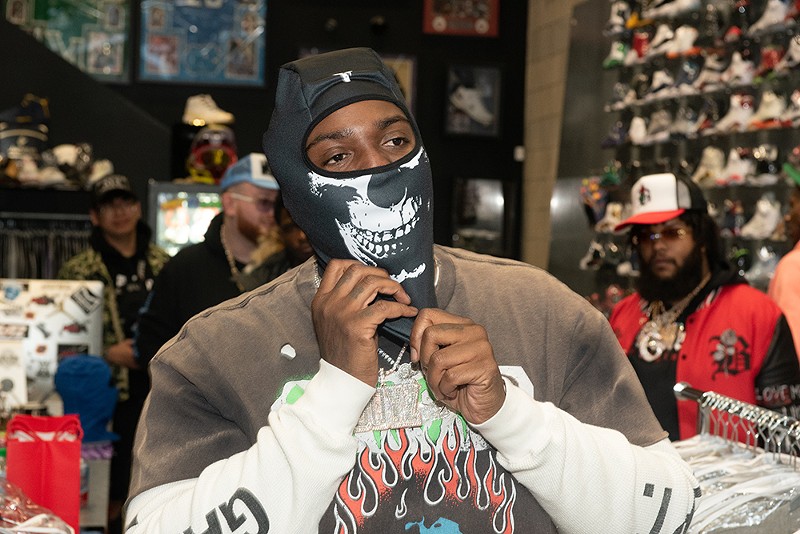
He pauses. "It wasn't until I caught my federal case in 2016," he says. "That's when I focused completely on rap. I got completely out the streets."
Around that time, Shami's Empire had been revolutionizing hip-hop through better artist-friendly deals and more digitally advanced ways to distribute music. Peezy decided to reach out.
"My man PhilthyRich was talking to Ghazi," Peezy says. "I had just caught a federal case, Philthy was with him, and I was like, 'Tell Ghazi to give me a deal, I'm broke as hell.' And he was like, 'Alright'. The papers came in an email. I flew out there, he gave me a bag, and the rest was history."
Peezy pressed forward and released The Realest EP in June of 2017, followed by the album Peoples Champ in August. Six months later he was shot during a robbery at a Citgo gas station in Warren after he had just gotten back in town from a show he did in Milwaukee.
"I don't know what the fuck happend, I just know I ended up in the hospital," Peezy says, shaking his head. "It was just some wrong place, wrong time type shit."
Tragedy struck again when Team Eastside member Antonio Carter (known as Eastsdie Snoop and BakinSoda) was shot and killed on Aug. 20, 2018 in a robbery attempt while sitting in a car on Flanders Street.
"It motivated me," says Peezy. "Just to be a stronger and better person, and keep going, that's it. Rest in peace Snoop."
Detroit producer Helluva spoke to Metro Times in an interview following Snoop's death. "When me and Snoop saw each other, it wasn't just, 'What's up?' It was, 'I miss you brother.' It was more than music, and when I saw him anywhere I knew I was good," he said. "I was blessed to have him on one of my favorite beats, 'If You Don't Work You Don't Eat' [...] That was Snoop and Team Eastside letting the world know they were here to stay."
On Oct. 1, Peezy released the song "Letter 2 Soda," a humble and emotional dedication to his fallen friend.
"Hard to talk to his momma 'cause I know she hurting/ I've been praying every night but I don't think it's working. I'ma hold my nigga down 'till they close the curtains/ they killed him for his watch it just wasn't worth it," Peezy raps.
Before the end of 2018 a photo of Peezy, Icewear Vezzo, Payroll Giovanni, and Tee Grizzley went viral in Detroit. The photo was taken during the filming of a music video for "2 Quick," a track featuring Peezy, Payroll, and Tee Grizzley. Doughboyz Cashout and Icewear Vezzo all had several cameos throughout the video. The issues between both groups had been resolved weeks earlier, and "2 Quick" was the musical exclamation point.
"We never had no personal problems. It wasn't nothing," Peezy says. "We was just kids at the time [...] '2 Quick' was when me and [Payroll] locked in, it was like, 'everybody cool now so we can do a song together.'"
"It just showed the maturity of Doughboyz Cashout as well as Team Eastside as a whole to put aside our differences to look at the bigger picture as far as blossoming and making money," Doughboy Clay told Metro Times earlier this year.
"2 Quick" received more than 9 million views on YouTube and Peezy and Payroll's highly anticipated album Ghetto Rich Niggaz dropped the following year. Peezy has also recorded songs with Doughboy Clay and Doughboy Scooch.
“People was getting sick and we didn’t know what the fuck was going on. This was before they named it COVID.”
tweet this
One of Peezy's most underrated attributes is his ear for talent. Much like Gucci Mane in Atlanta, Peezy always saw the star power in artists early in their careers. He was one of the few who wasn't shocked at Tee Grizzley's success. "I always knew he deserved it the first day I heard him," Peezy says.
He says he was certain 42 Dugg was going to rise to stardom. "He was a star in the streets so I knew he was going to be a star rapping," he says. "No matter what's going on he's always smiling. He ain't scared to play his music and be free."
At the top of 2019 Peezy was introduced to the music of Flint's Rio Da Yung OG by his friend KD and was immediately impressed. Again, he says he saw something nobody saw.
"I never heard nobody rap like that before," Peezy says. "Him nor Mike nor Lil E. There was a lot of them in Flint. They were in a group at a time but Rio stood out to me [...] I found out that he was Louie Ray's brother. We locked in and he never left."
Peezy not only recognized the greatness in Rio, he helped Rio to recognize the greatness within himself. He signed both Rio and RMC Mike to his #Boyz Entertainment label.
"I don't like when people say I put Rio on because I didn't," Peezy says. "I signed Rio, I discovered him. He put himself on."
"He took me to the street he grew up on, backed into his granny's driveway, and gave me one of the realest talks ever," Rio told No Jumper in a 2020 interview, adding, "He told me out his own mouth, 'if you keep rapping, I feel like you'll be bigger than me.'"
In the '90s Flint produced Michigan's first hip-hop superstar in MC Breed. His single "Ain't No Future in Yo' Frontin'' made him famous, and his 1992 album, The New Breed (with multiple appearances by 2Pac) made him a legend. His success spawned the careers of the Flint supergroup The Dayton Family. In the years since, Flint has never lost or lacked talent — they just needed a good push and more star power.
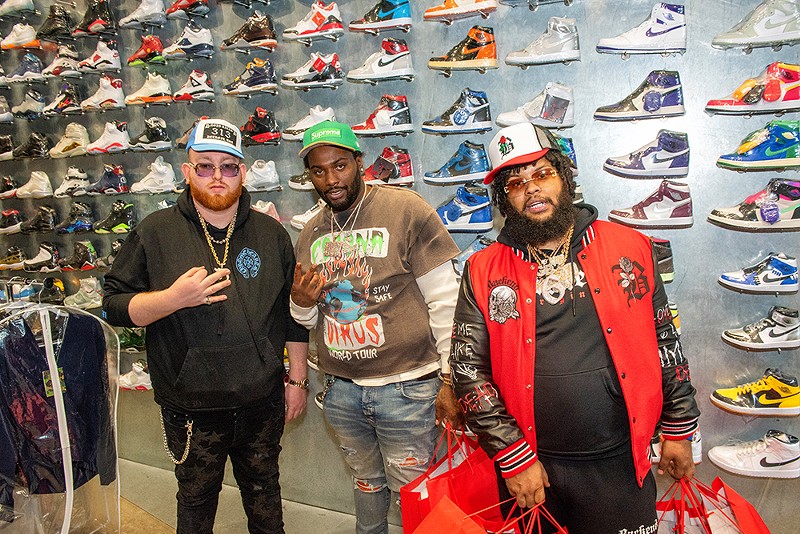
"Our music helped put Flint back on the map just from being different," says RMC Mike. "I think me and Rio came out with a whole new sound that no one has really heard and that's why I think it took off like it did. We just wanna bring back fun to the rap game and I believe that's exactly what it did."
Peezy helped help Rio curate his music and prepared him to get his projects out to a wider audience. But the federal case he caught in 2017 had reached a resolution, and Peezy was going to have to serve time in prison. He immediately began to get his affairs in order.
"I was just trying to save some money. I really wasn't thinking about music," Peezy says. "I probably put two projects out when I was in jail because I knew I wasn't about to be gone long. I wasn't tripping, I was just trying to make sure I had money put up for my family while I was there."
Peezy reported to jail in Elkton, Ohio the summer of 2019. When he arrived Street Lord Juan (who was incarcerated at the same prison) had a care package of sorts prepared for him.
"He had a bag for me with shoes, clothes, and food," Peezy says. "He knew I was coming and I knew he was there. That was my first time actually meeting him but we had talked before."
Juan's gesture was an expression of Detroit solidarity that he customarily showed incoming inmates.
"We had been communicating on the computer," Juan says. "So when he came in I just do what I always do. If a guy is coming in, and he's from the street and we got people in common, I make sure they got everything they need already."
As Peezy was incarcerated, COVID-19 was flipping the world upside down. Outside the jail cell mandatory quarantines were sweeping through the country, but that wasn't possible within the walls of a prison which left inmates extremely vulnerable.
"People was getting sick, and we didn't know what the fuck was going on," Peezy says. "This was before they named it COVID. And by us being in like a dorm, it was spreading rapidly. Since they didn't know what was going on there was nothing they could do about it 'till people started dying."
In a twisted bit of divine intervention, Peezy was sent to solitary confinement after he was caught with a cell phone.
"It just so happened I ended up going to the hole for three months," he says "It's just how God works. I missed the whole serious part of COVID."
“I wrote the whole ‘Free Rio’ album when I was in prison. I actually started writing it in the hole.”
tweet this
After serving 18 months, Peezy was released from prison on Feb. 10, 2021.
"Ghazi came to pick me up personally," he says. "Chelsea had $50,000 cash for me, and my girl was with me. I was feeling like a boss when I came home."
While Peezy was incarcerated, Rio took the spark Peezy lit under him and created a Class C fire. His popularity exploded the way Peezy knew it would. He has at least 17 songs that have gotten a minimum of 2 millions views each, and another 20 that have gotten at least 100k. However, as Peezy was walking out of prison, Rio was preparing to turn himself in to serve a 5-year sentence for a January 2019 arrest for gun possession with, "intent to distribute controlled substances."
"I got home and we had 4 or 5 months together," Peezy says. "We was together every single day before he went in. I don't think Rio felt it 'till the last day because he was so busy [...] He was a machine. He never stopped working. He never slept, he worked every single day, all day until it was time to go to jail."
On June 18, Peezy released the video "Build a Bear." It was the first song he had dropped since his release from prison, a return to his own brand of Detroit swagger.
"Louis shades on, hat to the back/ Switch on the glizzy, pocket full of racks. Miss my nigga Soda, we can't get him back /So any nigga that you catch, I got thirty racks," he raps.
"Pooh just called me up there and played the beat" Peezy says. "The beat gonna tell you what to say."
On July 2, 2021 Peezy released his album Free Rio, a solid 10-track body of work dedicated to his imprisoned friend.
"I wrote the whole Free Rio album when I was in prison," Peezy says. "I actually started writing it in the hole."
Toward the end of 2021, another photo of Peezy went viral in Detroit, this time showing him with curls in his hair.
"I didn't have anything to do with my hair. I wanted to look like Snoop Dogg, but my hair wasn't long enough," Peezy says. "I just told her to curl it. Once it got done, I saw it and I said, 'this some fly shit.'"
Fans compared Peezy's new curled hair-do to that of Big Worm, a character from the 1995 movie Friday portrayed by Faizon Love. The photo generated so much energy Peezy decided to record a song and video actually called, "Big Worm."
"It wasn't a thing to make no music about it, but that's how God works," Peezy says. "It just put a spark in me to start back dropping music. The 'Big Worm' concept put me back in a creative space."
“If I scuff these up before the show I’m not wearing them!”
tweet this
Peezy walks from upstairs, grabs a green and yellow Supreme fitted baseball cap, and puts it on his head. "I think I gotta have this," he says.
He grabs an all-white Nike Air Force 1 sneaker off the wall as well, and asks if they have his size. "If I scuff these up before the show I'm not wearing them," he says through a laugh.
Even though Peezy is currently standing on the precipice of the next big wave of his career, he'll always be viewed in Detroit as a native son to the east side, Cedargrove's baby boy who's all grown up and making the city proud. As much as he is known for going hard in the streets and hard in his music, he goes just as hard for his family. Through all the ups and downs in his life there has always been a sense of responsibility as a provider and protector. Recently he and Koko welcomed a new addition to their family.
"When I had my first son I was real young. I was basically still a kid with a kid," he says. "So now I'm a grown man with a newborn son and it's like I get to do it all over again. I love every minute of it."
Peezy has also purchased mutiple homes in his old neighborhood for his mother.
"It felt good to be able to do that," he says confidently. "I ain't gonna lie, but it don't mean shit because it ain't no mansion. It's going to feel like more when I move her out the hood. I bought her a few houses because she wants to work on projects, and as her son that's what I'm supposed to do."
Peezy appreciates that he's known as someone who's constantly championed Detroit hip-hop, brought the east side back to life, and also gave jolt to the Flint hip-hop scene. He's simultaneously been playing the role of artist and architect his whole career. Even though he's been consistently releasing music over the years, Peezy promises his next album will be the ultimate game-changer. He's grown a lot as an artist and he wants the world to know it, recently dropping a hot 16 on Icewear Vezzo's "The Commission" that also features Payroll Giovanni. The song continues the unification of three of Detroit's most popular emcees, and is a bit of a precursor to the kind of music fans can expect from Peezy's highly anticipated album, set to drop any day now. (He's been teasing dates on Instagram, but no official date has been set.)
"This next album, he's stepping outside his comfort zone," says Donini. "He's trying new sounds, new artists to collaborate with, and I hope that it takes him to the next level to introduce him to a wider audience."
"It's just time to put a solid body of work out and get to charting around this muthfucka," Peezy adds. "I'm a big artist so I gotta put out big music [...] I'm going down as a nigga who gave them a song for everything they was going through. An open book, nothing to hide. From feel-good shit to depression, or even if you going through something with your parents or kids, I make music for that."
Peezy looks at Noah, pulls out a wad of cash, and peels off several hundreds as Noah begins to bag up his purchases. He's adamant about not being complacent or overly enjoying the moment. Life is long, and he has a lot of ambition.
"I can't enjoy the journey yet," he says. "We got money to get, we got goals, we got shit to do. We got kids to put through school, we got friends to save, we ain't did shit yet."
Stay connected with Detroit Metro Times. Subscribe to our newsletters, and follow us on Google News, Apple News, Twitter, Facebook, Instagram, Reddit, or TikTok.

